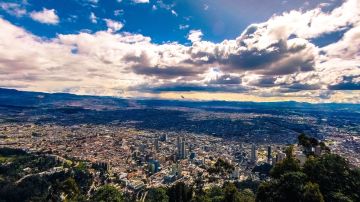13 Latin American Places with Indigenous Names
In some Latino countries and cultures, the indigenous influence is tightly woven into many people’s identity

Photo: Unsplash/@gardnerjorge
In some Latino countries and cultures, the indigenous influence is tightly woven into many people’s identity. In others, they are wrongly encouraged to embrace more of (or only) the Spanish influence, and less of the native. The truth is, that every Latin American country has several indigenous cultures who are an undeniable part of its history, identity, and culture. Their influence can be seen everywhere, if we recognize where to look. In an effort to bring the focus back on the American Indian peoples of Latin American, let’s learn about place names whose etymology was derived from indigenous words.
wp_*posts
Colombia: Bogotá
Bogotá is the capital of Colombia. The name is derived from Bacatá, the name the Muisca gave for the area before the arrival of the Spanish. The word means “Lady of the shining mountain.”
wp_*postsArgentina: Quilmes
Not only is Quilmes the name of an Argentinian city, but it also is the name of one of the country’s top beers. The Quilmes were indigenous people of Argentina. The city is named after the land (once a restricted colony) where they were forced to live after the Spanish pushed the Quilmes out of their original home near Tucumán.
wp_*postsBolivia: Copacabana
Like Brazil, Bolivia also has a Copacabana. There are two theories as to how the town got its name. One is that it is named after the Aymara phrase for “view of the lake,” kota kahuana. Another hypothesis is that Copacabana comes from Kotakawana, the god of fertility. A temple of Kotakawana was built in the area, the Basilica of Our Lady of Copacabana was later built on the same land.
wp_*postsBrazil: Ipanema
You may know of the song, “Girl from Ipanema,” but do you know where the name of the Rio de Janeiro neighborhood originated? It is an indigenous word from the Tupi people, which means “dirty/bad water/river without fish,” or “stinky lake.”
wp_*postsCuba: Guanabacoa
https://www.instagram.com/p/BsGv1WqF3mp/
Guanabacoa is a colonial township in Havana. There are varying theories on what the indigenous names mean. Some say it equates to “high palm grove,” while others state that it means “place of many waters or plenty of water.”
wp_*postsDominican Republic: Cibao
The Cibao is a northern region in the Dominican Republic. Its name comes from the Taino Ciba-o, when means “rocky land” [“rock” (ciba), and “land” (o)].
wp_*postsVenezuela: Maracaibo
Maracaibo is a city in Northeastern Venezuela. It is said that its name comes from Mara, a chief who died fighting the Spanish. When he fell, his people yelled, “Mara kayó!” (“Mara fell!”). Another idea is that Maracaibo comes from Maara-iwo, the first name of the area meaning “place where the serpents abound.”
wp_*postsEcuador: Quito
https://www.instagram.com/p/BrnR8K5AulJ/
Quito, the capital of Ecuador was once called San Francisco de Quito. This is part of a trend in Latin America, where Spanish saint names were combined with indigenous place names. Quito comes from the Quitu people, an indigenous group from before the arrival of Christopher Columbus. The Quitus were said to have lost to the Caras, who further built the Kingdom of Quito. wp_*posts
Puerto Rico: Bayamón
In Puerto Rico, there is a municipality called Bayamon. Its name either came from Bahamon, a Taino chief, or the Taino word Bayamongo, which is the name of a river in the area.
wp_*postsMexico: Cancún
So many people have heard about sunny Cancún, but do you know where its name originated? It is said to come from the Mayan words kaan kun, which either mean “nest of snakes” or “place of the golden snake.”
wp_*postsNicaragua: Masaya
https://www.instagram.com/p/BsKEau5jEI1/
Masaya is the name of a department, city, and volcano in Nicaragua. The city and department are named after the volcano. Masaya is said to originate from the Ch’orti’ words max tsa ya, which mean “wet, toxic cavity.”
wp_*postsEl Salvador: Cojutepeque
Cojutepeque is a city in the Central American country of El Salvador. The word cojutepeque means “at the hill of the turkeys” in Nahuatl.
wp_*postsGuatemala: Guatemala
The name Guatemala is another that is derived from an indigenous word. Some believe that Guatemala is from the Maya-Toltec word Goathemala (“land of the trees”), while others think that the name came from the Nahuatl word Quauhtlemallan which means “land of many trees.” Other theories offer additional origins.

















